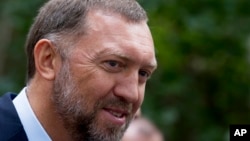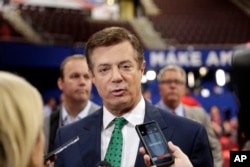Oleg Deripaska, the Russian oligarch connected in press reports Wednesday to former Trump campaign manager Paul Manafort, has a long history of connections with senior U.S. politicians, including Senator John McCain and former senator Bob Dole.
Deripaska was listed by Forbes magazine in 2008 as Russia’s richest oligarch, with a fortune the business magazine then assessed at $28 billion. He is suddenly back in the news, despite the fact that Forbes now estimates his wealth at a mere $5.1 billion.
The reason? The Associated Press reported Wednesday that President Donald Trump's former campaign chairman, Paul Manafort, secretly worked with Deripaska a decade ago to advance Russian President Vladimir Putin’s interests and proposed a strategy to undermine anti-Russian opposition in former Soviet states.
Manafort has confirmed the AP’s report that he represented Deripaska almost a decade ago “on business and personal matters in countries where he had investments,” but says his work for Deripaska “did not involve representing Russian political interests.”
Oleg Deripaska began building his business empire in the 1990s, a period that saw a wild scramble to grab the most valuable assets of the moribund Soviet economy – a contest that was often accompanied by violence.
Russia’s post-Soviet metals sector saw a particularly violent division of spoils, and the bloodshed which accompanied the fight to control the country’s aluminum smelters - involving ambitious young businessmen like Deripaska, organized crime hitmen and their numerous victims - became the stuff of legend.
Deripaska has admitted that, while navigating this Hobbesian world, he made protection payments to criminal gangs and local police, and set up a security force consisting of former KGB agents and soldiers.
“The first time I was directly threatened ... two weeks later my commercial director was shot two times in the head,” Deripaska told London’s Telegraph in 2012. “This was how, finally, I decided it was better to pay for the moment to stay alive and for my people to stay alive... I hated having to pay but there was no other safe choice, for me or my staff.”
As a Russian metals analyst told Britain’s Spectator magazine in 2007: “Many people were killed during the aluminium wars. Deripaska survived, and won.”
In 2000, Deripaska and fellow Russian billionaire Roman Abramovich, who owns Britain’s Chelsea soccer team, created Russian Aluminum (RusAl), which is now the world’s sixth largest aluminum company. Deripaska owns a controlling share of RusAL and is its president. He also owns Basic Element, a Russian holding company with assets in the energy, manufacturing, financial services, agriculture, construction and aviation sectors.
Deripaska is married to Polina Yumashev, the daughter of Valentin Yumashev, former President Boris Yeltsin's chief of staff. After her birth, Valentin Yumashev married Tatyana Dyachenko, the younger daughter of Yeltsin.
Some of Deripaska’s past has apparently come back to haunt him. He was reportedly barred for years from entering the United States because of alleged ties with organized crime, and while that ban was lifted in 2005, it was reimposed in 2006.
Deripaska enlisted help to try to overcome these hurdles. For example, he reportedly paid $560,000 in the early 2000s to Alston & Bird, the law firm of Bob Dole, the former U.S. Senate majority leader and 1996 Republican presidential nominee, which was able to get Deripaska’s U.S. visa reinstated, at least for a time.
In addition, the Washington Post reported in January 2008 that Rick Davis, who was then the manager of Senator John McCain’s presidential campaign, helped arrange a drinks-and-dinner meeting in January 2006 between Deripaska and a small group of U.S. senators, including McCain, near Davos, Switzerland, where the World Economic Forum was taking place.
According to the newspaper, seven months later, in August 2006, Davis, McCain and Deripaska attended a dinner in Montenegro, whose governing party had a contract with the lobbying firm that Davis ran together with Paul Manafort.
“Afterward, a group from the dinner took boats out to a nearby yacht moored in the Adriatic Sea, where champagne and pastries were served, partly in honor of McCain's 70th birthday,” the Washington Post reported.
The newspaper quoted a spokesman for McCain as saying neither the senator nor Davis recalled Deripaska being on the yacht after dinner.
The spokesman, Mark Salter, told the Post that McCain’s meetings with Deripaska took place during official overseas trips by U.S. senators and that any contact with the Russian tycoon was “social and incidental” and did not constitute a “private meeting.”





